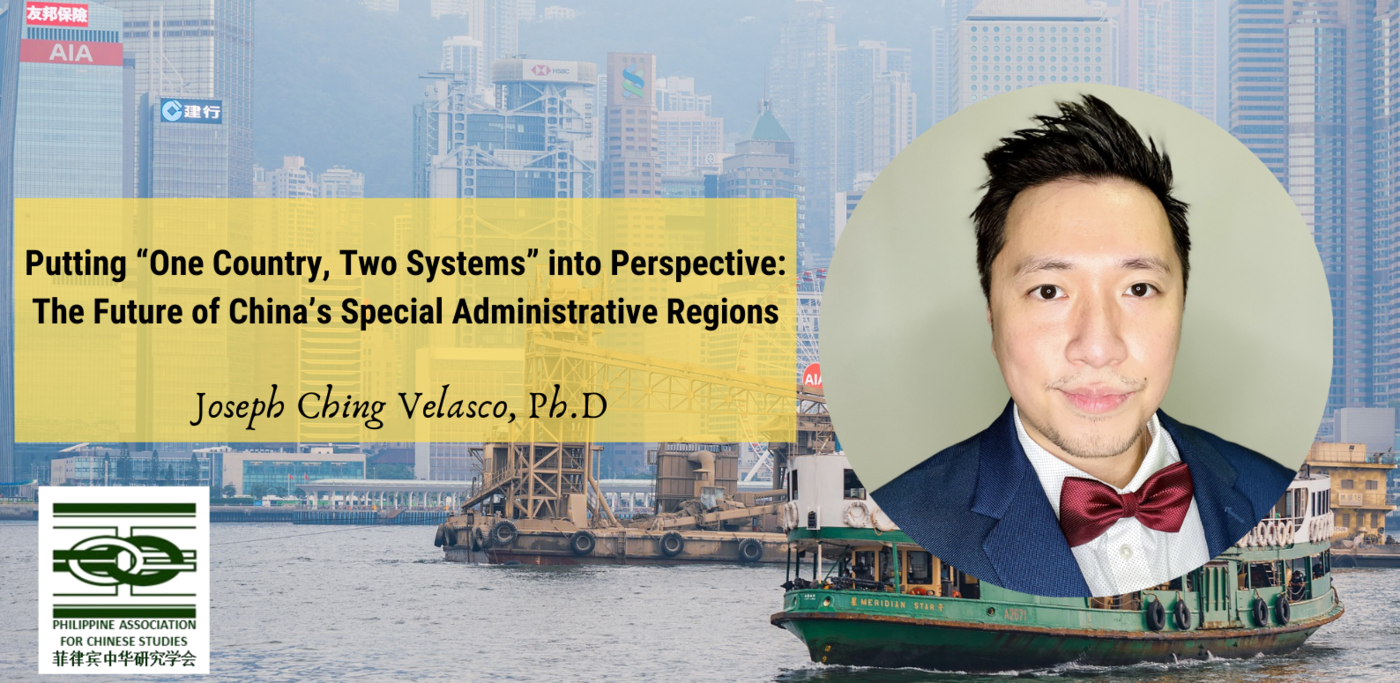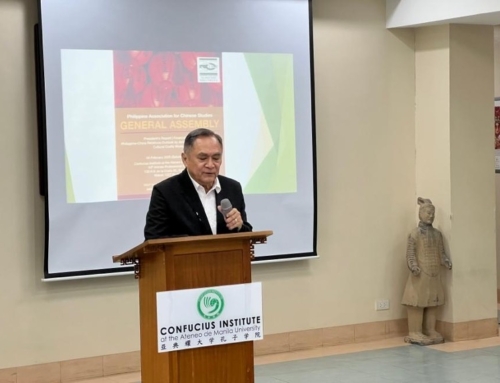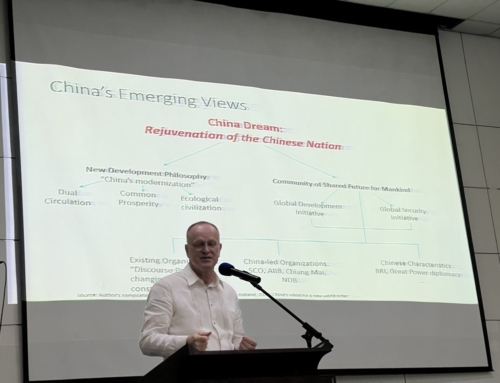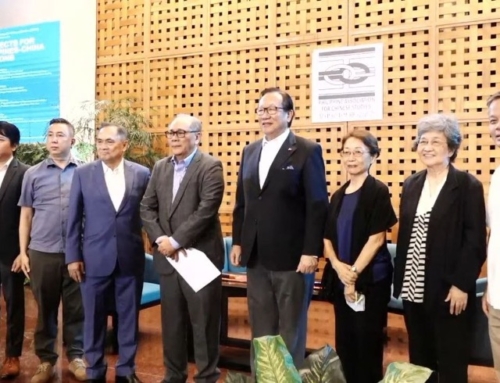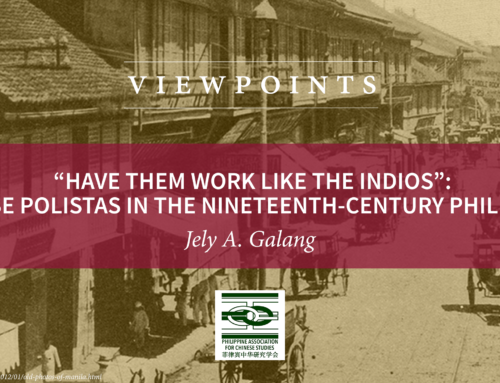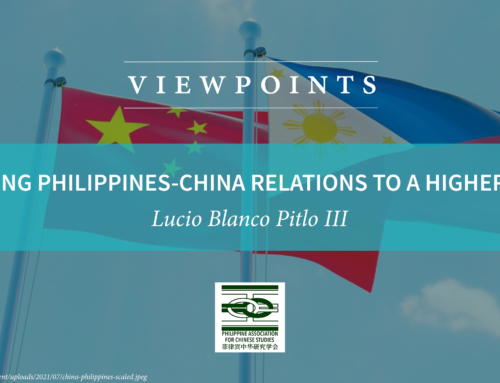by Joseph Ching Velasco, Ph.D.
19 November 2021 – After social unrest plagued Hong Kong in 2019, doubts have emerged about the robustness of China’s “One Country, Two Systems.”
When colonial rule over Hong Kong and Macau officially ended in the 1990s, these territories returned to the fold of mainland China under a special arrangement called “one country, two systems.” The conditions for Hong Kong and Macau’s return to Chinese sovereignty from Britain and Portugal were influenced by the 1984 Sino-British Joint Declaration and the 1987 Sino-Portuguese Joint Declaration. In theory, Hong Kong and Macau under “one country, two systems” enjoy relative autonomy from mainland China for a period of 50 years. This supposedly ends in 2047 for Hong Kong and 2049 for Macau. In this short article, I offer a modest assessment of the “one country, two systems” framework while taking into consideration recent developments in the special administrative regions of China.
Social Unrest in Hong Kong and its Return to Relative Normalcy
During the period of social unrest in Hong Kong in 2019, I periodically visited the city. At the time, pockets of demonstrations have parodically erupted, but I had no idea that the anti-government movement was yet to reach its peak. MTR stations were vandalized, pavements were pulled apart, roadways were blocked, and instances of violence occurred. Hong Kong was in a standstill.
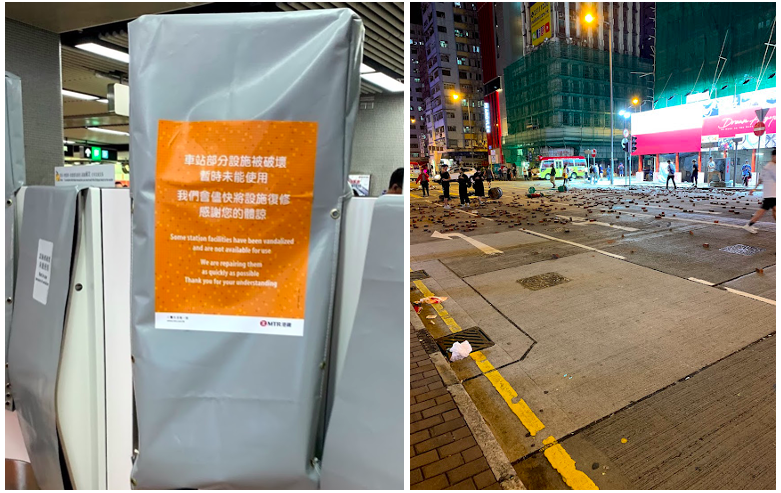
Vandalized MTR station and disassembled pavement in Hong Kong, photos taken October 2019.
The SAR was fraught with severe tensions between demonstrators and the city’s security forces. In addition, clashes between groups who are sympathetic to the government and those who are against it also occurred. The clashes peaked when demonstrators seized universities to enact maximum disruption to the city. Hong Kong’s extremely volatile situation at the time was abundantly covered by global media, it was a city plunged into an unprecedented crisis (Sin & Job, 2019). Some major powers such as the US, UK, and the EU were alarmed and expressed deep concern for the SAR.
With the government not acceding to the other demands of the protesters and the latter remaining insistent, an impasse transpired without a solution in sight. The wanton destruction of private property likewise shocked the city’s inhabitants, which led to a sterner response from the state. This paved the way for the passing of the National Security Law. Despite concerns and apprehension from some pockets of Hong Kong society, the law did return a sense of calm and normalcy to the region. Wu (2019) asserts that there are two possible scenarios for Hong Kong. The government may continue to hold dialogue with the public which leads to the cessation of the anti-government movement or the overwhelming escalation of violence in the city. With the swift implementation of the National Security Law and the ongoing COVID-19 pandemic, the anti-government movement gradually dissipated. Chief Executive Carrie Lam, in her recent policy address, even touts that Hong Kong “got back on the right track of ‘One Country, Two Systems’ and that governance has returned to normal under the protection of the National Security Law” (The Government of Hong Kong Special Administrative Region, 2021).
Macau and its Harmonious Relationship with the Mainland
While Hong Kong was inundated with social unrest that highlighted its antagonistic relationship with the mainland, the case for Macau was different. There were apprehensions that the protest might spread from Hong Kong to Macau, but such did not occur. This can be ascribed to Macau’s deeper integration and harmonious dynamics with the mainland. Notably, the difference in the sense of identity between those from the mainland and Macau have mostly been inconspicuous. José Luis de Sales Marques, the SAR’s mayor from 1993 to 2001, has even emphasized that [Macau] “is China and no one questions it here” (Gunia, 2019).
As a special administrative region where gambling is allowed, Macau is incentivized to continue its positive relationship with mainland China. Pre-pandemic figures show that the gaming sector contributed more than half of the SAR’s GDP, provided employment for approximately 17% of its residents, and produced 80% of the city’s tax revenue (Barrett, 2021). What can be observed in Macau’s implementation of “one country, two systems” is its prioritization of economic development over issues pertaining to civil liberties. This kind of disposition can possibly be traced back to the handover when Portugal did not necessarily insist on promoting Macau’s democratization (Wong & Xiao, 2018).
“One country, two systems” exhibits immense potential when left unchallenged as demonstrated by Macau. It has enabled the SAR to enormously benefit from its prospering relationship with the mainland. Macau’s Chief Executive Ho Iat Seng underscores that “one country, two systems” is indeed “viable, achievable, and popular” (Government Portal of Macao SAR, 2019). Consequently, the European Commission (2020) deemed that “the rights and fundamental freedoms and the rule of law were generally respected to the extent guaranteed in the Basic Law of Macau and in conformity with the ‘one country, two systems’ principle.”
The Future of China’s Special Administrative Regions
China published a white paper that states “‘two systems’ is

Ponte 16 in Macau, taken April 2019.
subordinate to and derived from ‘one country’” and “‘two systems’ under the ‘one country’ are not on a par with each other” (State Council of the People’s Republic of China, 2014) The special administrative regions’ high sense of autonomy, even though guaranteed in the Basic Law, is also predicated on the mainland’s interpretation of the concept. Therefore, “one country, two systems” is not solely a legal arrangement between the mainland and its special administrative regions but also a deliberate manifestation of China’s political tolerance for Hong Kong and Macau.
Based on recent developments in both special administrative regions, there is further integration among Hong Kong, Macau, and the mainland through the Greater Bay Area scheme. This links the two SARs and other cities in southern China to form an economic and technological development hub (Yu, 2019). This gradual strategy of absorption and assimilation of Hong Kong and Macau has already been set into motion through its mainlandization. Lo (2007) defines mainlandization as being “more politically dependent on Beijing, economically more reliant on the mainland’s support, socially more patriotic toward the motherland, and legally reliant on the interpretation of Basic Law by China’s National People’s Congress” (p. 186).
While there has been no shortage of critique on how “one country, two systems” is being interpreted and implemented in the special administrative regions, I still remain optimistic for Hong Kong and Macau. With the exigencies of the COVID-19 pandemic, both special administrative regions have exhibited great resiliency. As of October 8, 2021, Hong Kong is ranked fifth in The Economist’s (2021) Global Resiliency Index and seventh in Nikkei Asia (2021) COVID-19 Recovery Index. In a similar vein, Macau only has 77 COVID-19 cases as of October 18, 2021; one of the lowest in the world. Both special administrative regions are on a steady path to recovery and it seems that its prospects are inextricably tied with the future of mainland China.
_____
